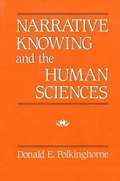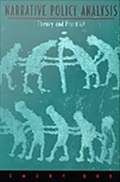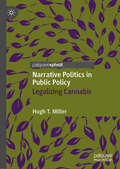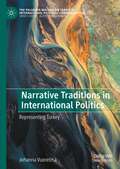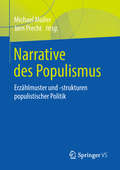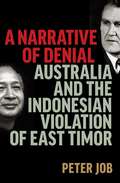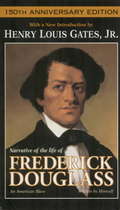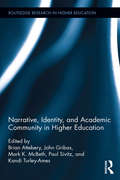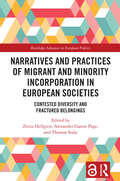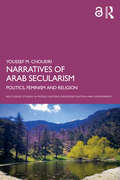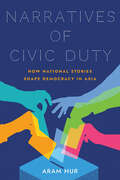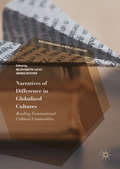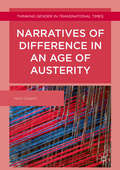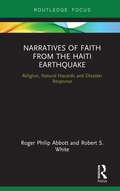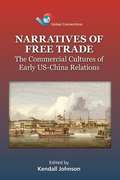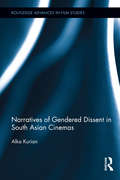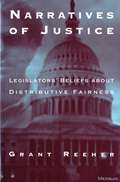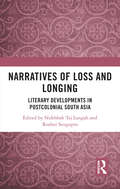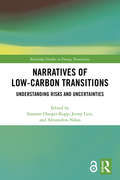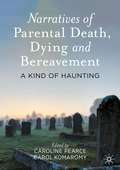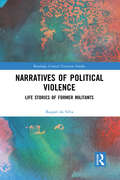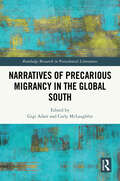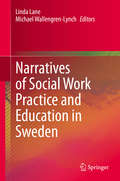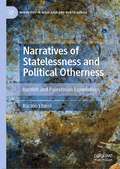- Table View
- List View
Narrative Knowing and the Human Sciences
by Donald PolkinghorneThis book expands the concept of the nature of science and provides a practical research alternative for those who work with people and organizations. <p><p> Using literary criticism, philosophy, and history, as well as recent developments in the cognitive and social sciences, Narrative Knowing and the Human Sciences shows how to use research information organized by the narrative form―such information as clinical life histories, organizational case studies, biographic material, corporate cultural designs, and literary products. The relationship between the narrative format and classical and statistical and experimental designs is clarified and made explicit. Suggestions for doing research are given as well as criteria for judging the accuracy and quality of narrative research results.
Narrative Policy Analysis
by Practice TheoryNarrative Policy Analysis presents a powerful and original application of contemporary literary theory and policy analysis to many of today's most urgent public policy issues. Emery Roe demonstrates across a wide array of case studies that structuralist and poststructuralist theories of narrative are exceptionally useful in evaluating difficult policy problems, understanding their implications, and in making effective policy recommendations. Assuming no prior knowledge of literary theory, Roe introduces the theoretical concepts and terminology from literary analysis through an examination of the budget crises of national governments. With a focus on several particularly intractable issues in the areas of the environment, science, and technology, he then develops the methodology of narrative policy analysis by showing how conflicting policy "stories" often tell a more policy-relevant meta-narrative. He shows the advantage of this approach to reading and analyzing stories by examining the ways in which the views of participants unfold and are told in representative case studies involving the California Medfly crisis, toxic irrigation in the San Joaquin Valley, global warming, animal rights, the controversy over the burial remains of Native Americans, and Third World development strategies. Presenting a bold innovation in the interdisciplinary methodology of the policy sciences, Narrative Policy Analysis brings the social sciences and humanities together to better address real-world problems of public policy--particularly those issues characterized by extreme uncertainty, complexity, and polarization--which, if not more effectively managed now, will plague us well into the next century.
Narrative Politics in Public Policy: Legalizing Cannabis
by Hugh T. MillerThis book draws on examples from cannabis policy discourse and elsewhere to illustrate how individuals come to subscribe to a particular policy narrative; how policy narratives evolve; how narratives are employed in public policy discourse to compete with other narratives; and how, on implementation, the winning narrative is performed and subsequently institutionalized. Further, it explores how uncertainty and ambiguity are constants in public policy discourse, and how different factions and groups pursue different goals and aspirations. In the current climate of political reality, disputable facts and contestable goals, this book shows how different coalitions and ideologies use narratives to compete for policy dominance.
Narrative Traditions in International Politics: Representing Turkey (The Palgrave Macmillan Series in International Political Communication)
by Johanna VuorelmaThis book introduces the concept of narrative tradition to study representation in international politics. Focusing specifically on the case of Turkey, the book shows how narrative traditions are constructed, maintained, and passed on by a loose epistemic community that involves practitioners and experts including scholars, journalists, diplomats, and political representatives. Employing an interpretative approach, the book distinguishes between four narrative traditions in the study of Turkey: Turkey as a state that is (1) getting lost, (2) standing at a decisive crossroad, (3) led by strongmen, and (4) struggling with a creeping Islamisation.These narrative traditions carry enduring beliefs that not only describe, moralise, judge, and stigmatise Turkey, but also contribute to the idea of the West. The book focuses on knowledge that is produced from a Western perspective, showing that Turkey provides a channel through which the Western self can be debated, challenged, celebrated, and judged.
Narrative des Populismus: Erzählmuster und -strukturen populistischer Politik
by Michael Müller Jørn PrechtPopulistische Ideologeme und populistische Kommunikation beruhen auf Narrativen, also erzählerischen Grundmustern, die gesellschaftliche Denkmuster abbilden. Eine narrative Analyse dieser Muster führt zu einem besseren Verständnis des Phänomens des Populismus. In diesem Band setzen sich die Autoren mit diesen Erzählmustern und -strukturen populistischer Politik auseinander und stellen die Frage nach dem Zusammenhang politischer und medialer Diskurse im thematischen Feld des Populismus.Der InhaltPopulismus - Versuch einer begrifflichen Differenzierung • Umrisse des populistischen Narrativs als Identitätspolitik • Narrative der Demokratie • Volkserzählungen • Eklektizismus populistischer Narrative • Populistische Narrative im sozialen Netzwerk • Erzählformen des Populismus • Populismus in den LeitmedienDie HerausgeberDr. Michael Müller ist Professor für Medienkonzeption und Medienanalyse, Semiotik und Erzähltheorie. Er leitet das Institut für Angewandte Narrationsforschung (IANA) der Hochschule der Medien in Stuttgart.Jørn Precht ist Professor für Transmediales Storytelling, Dramaturgie und Stoffentwicklung für AV- und Online-Medien an der Hochschule der Medien in Stuttgart und leitet dort das Institut für Angewandte Narrationsforschung (IANA).
Narrative of Denial: Australia and the Indonesian Violation of East Timor
by Peter JobThe Indonesian invasion of East Timor in 1975 led to a prolonged conflict, severe human rights abuses and a large loss of life. From 1975 to 1983 the Indonesian military's campaign of 'encirclement and annihilation' destroyed rural food resources, creating the famine that took most of the lives lost during the occupation. The Australian governments of Gough Whitlam and Malcolm Fraser presented themselves as advocates for human rights and the international rule of law, while viewing relations with Indonesia as key to their foreign policy objectives. These positions came into conflict due to the Indonesian invasion of East Timor. Based upon an extensive study of Australian foreign affairs archives, as well as interviews, A Narrative of Denial demonstrates how the Australian government responded to the conflict by propagating a version of events that denied the reality of the catastrophe occurring in East Timor. It worked to protect the Suharto regime internationally, thereby allowing it to continue its repression relatively unhindered. This remarkable story will unsettle existing perceptions of how Australia operates in world affairs.
Narrative of the Life of Frederick Douglass: An American Slave (Text Connections)
by Frederick Douglass Henry Louis GatesThis dramatic autobiography of the early life of an American slave was first published in 1845, when its young author had just achieved his freedom. Douglass' eloquence gives a clear indication of the powerful principles that led him to become the first great African-American leader in the United States.
Narrative, Identity, and Academic Community in Higher Education (Routledge Research in Higher Education)
by Brian Attebery John Gribas Paul Sivitz Kandi Turley-Ames Mark K. McBethGrounded in narrative theory, this book offers a case study of a liberal arts college’s use of narrative to help build identity, community, and collaboration within the college faculty across a range of disciplines, including history, psychology, sociology, theatre and dance, literature, anthropology, and communication. Exploring issues of methodology and their practical application, this narrative project speaks to the construction of identity for the liberal arts in today’s higher education climate. Narrative, Identity, and Academic Community focuses on the ways a cross-disciplinary emphasis on narrative can impact institutions in North America and contribute to the discussion of strategies to foster bottom-up, faculty-driven collaboration and innovation.
Narratives and Practices of Migrant and Minority Incorporation in European Societies: Contested Diversity and Fractured Belongings (Routledge Advances in European Politics)
by Thomas Sealy Zenia Hellgren Alexander Gamst PageThis book explores the disjuncture that emerges at various levels in European diversity management policies and their translation into practice.It shows that state-wide strategies can only guide diversification outcomes, not wholly control them, and in practice, national level integration policies rely on multi-level involvement including authorities at regional or local levels and civil society organisations. The book demonstrates a complex and varied picture of the ways in which different European countries engage with ethnic diversity, as well as to the internal (in)consistency of the philosophical underpinnings of this engagement. As such, it draws attention not just to ways in which diversity "is done," but illuminates processes and narratives which are messy, contested, and contradictory.This book is of key interest to scholars, students, and practitioners involved in integration, ethnic and cultural diversity studies, migration and immigration, citizenship, ethnicity, and more broadly to European studies, and the wider social sciences.
Narratives of Arab Secularism: Politics, Feminism and Religion (Routledge Studies in Middle Eastern Democratization and Government)
by Youssef M. ChoueiriThis book offers a new interpretation of the rich narratives of Arab secularism, contending that secularism as a set of ideas and a social movement is destined to loom large on the political and legal horizon of most Arab states. Youssef M. Choueiri provides a study of three moments in the development of secularism in the Arab World, the Machiavellian, the Alfierian and the Gramscian. It is within such a scope that secularism in its interaction with state-building projects, women’s emancipation and religion is treated as an intellectual current and a discursive entity embedded in the political process of its diverse societies. Through the chapters, Choueiri demonstrates how secularism occupies a pivotal presence in the religious and political life of the Arab world, exploring such interrelated configurations as indigenous contributions, diverse reforms and the impact of Western states. He concludes that secularism has become a moral prerequisite and a required vehicle in creating the necessary conditions for the success of democracy in the Middle East. Narratives of Arab Secularism tackles the complexity and contemporary ramifications of the subject in a way that no previous single study has been able to. It will be relevant to both students and academics dealing with topics related to the Middle East including religion, politics, anthropology and history.
Narratives of Arab Secularism: Politics, Feminism and Religion (Routledge Studies in Middle Eastern Democratization and Government)
by Youssef M. ChoueiriThis book offers a new interpretation of the rich narratives of Arab secularism, contending that secularism as a set of ideas and a social movement is destined to loom large on the political and legal horizon of most Arab states.Youssef M. Choueiri provides a study of three moments in the development of secularism in the Arab World, the Machiavellian, the Alfierian and the Gramscian. It is within such a scope that secularism in its interaction with state-building projects, women’s emancipation and religion is treated as an intellectual current and a discursive entity embedded in the political process of its diverse societies. Through the chapters, Choueiri demonstrates how secularism occupies a pivotal presence in the religious and political life of the Arab world, exploring such interrelated configurations as indigenous contributions, diverse reforms and the impact of Western states. He concludes that secularism has become a moral prerequisite and a required vehicle in creating the necessary conditions for the success of democracy in the Middle East.Narratives of Arab Secularism tackles the complexity and contemporary ramifications of the subject in a way that no previous single study has been able to. It will be relevant to both students and academics dealing with topics related to the Middle East including religion, politics, anthropology and history.Chapter 6 of this book is freely available as a downloadable Open Access PDF at http://www.taylorfrancis.com under a Creative Commons Attribution-Non Commercial-No Derivatives (CC-BY-NC-ND) 4.0 license.
Narratives of Civic Duty: How National Stories Shape Democracy in Asia (Studies of the Weatherhead East Asian Institute, Columbia University)
by Aram HurIn Narratives of Civic Duty, Aram Hur investigates the impulse behind a sense of civic duty in democracies. Why do some citizens feel a responsibility to vote, pay taxes, or take up arms in defense of one's country? Through comparing democratic societies in East Asia and elsewhere, Hur shows that the sense of obligation to be a good citizen—upon which the resilience of a democracy depends—emerges from a force long thought to be detrimental to democracy itself: national attachments.Nationalism's illiberal and exclusive tendencies are typically viewed as disruptive to democratic processes, but Hur argues that there is nothing inherently antidemocratic about nationalism. Rather, whether nationalism helps or hinders democracy is shaped by the historicized relationship between a national people and their democratic state. When national stories portray that relationship as one of mutual commitment, nationalism strengthens democracies by motivating widespread civic duty among citizens. Drawing on personal narratives, statistical surveys, and experiments, Narratives of Civic Duty offers a provocative national theory of civic duty that cuts to the heart of what makes democracies thrive.
Narratives of Difference in Globalized Cultures
by Belén Martín-Lucas Andrea RuthvenThis book is about how the marketing of transnational cultural commodities capitalizes on difference and its appeal for cosmopolitan consumers in our postmodern globalized world. At what price? What ethical and political conundrums does the artist/writer/reader confront when going global? This volume analyzes why difference - whether gender, sexual, racial, ethnic, or linguistic - has become such a prominent element in the contemporary cultural field, and the effects of this prevalence on the production, circulation and reception of cultural commodities in the context of globalization. At the intersection of globalization, diaspora, postcolonial and feminist studies in world literature, these essays engage critically with a wide variety of representative narratives taken from diverse cultural fields, including humanitarian fiction, multilingual poetry, painting, text-image art, performance art, film, documentary, and docu-poetry. The chapters included offer counter-readings that disrupt hegemonic representations of cultural identity within the contemporary, neoliberal and globalized landscape.
Narratives of Difference in an Age of Austerity
by Irene GedalofThis book traces the narrative strategies framing austerity policies through an illuminating analysis of policy documents and political discourses, exposing the political consequences for women, racialized minorities and disabled people. While many have critiqued the ways in which austerity has captured the contemporary political narrative, this is the first book to systematically examine how these narratives work to shift the terms within which policy debates about inequality and difference play out. Gedalof's exceptional readings of these texts pay close attention to the formal qualities of these narratives: the chronologies they impose, their articulation of crisis and resolution, the points of view they construct and the affective registers they deploy. In this manner she argues persuasively that the differences of gender, race, ethnicity and disability have been stitched into the fabric of austerity as excesses that must be disavowed, as reproductive burdens that are too great for the austere state to bear. This innovative, intersectional analysis will appeal to students and scholars of social policy, gender studies, politics and public policy.
Narratives of Faith from the Haiti Earthquake: Religion, Natural Hazards and Disaster Response (Routledge Focus on Religion)
by Roger Philip Abbott Robert S. WhiteThis book presents an in-depth ethnographic case study carried out in the years following the 2010 Haiti earthquake to present the role of faith beliefs in disaster response. The earthquake is one of the most destructive on record, and the aftermath, including a cholera epidemic and ongoing humanitarian aid, has continued for years following the catastrophe. Based on dozens of interviews, this book gives primacy to survivors’ narratives. It begins by laying out the Haitian context, before presenting an account of the earthquake from survivors’ perspectives. It then explores in detail how the earthquake affected the religious, mainly Christian, faith of survivors and how religious faith influenced how they responded to, and are recovering from, the experience. The account is also informed by geoscience and the accompanying "complicating factors." Finally, the Haitian experience highlights the significant role that religious faith can play alongside other learned coping strategies in disaster response and recovery globally. This book contributes an important case study to an emerging literature in which the influence of both religion and narrative is being recognised. It will be of interest to scholars of any discipline concerned with disaster response, including practical theology, anthropology, psychology, geography, Caribbean studies and earth science. It will also provide a resource for non-governmental organisations.
Narratives of Free Trade
by Kendall JohnsonThe twelve essays in this collection focus on the first commercial encounters between an ancient China on the verge of systemic social transformations, and a fledgling United States, struggling to assert itself globally as a distinct nation after the Revolutionary War with Great Britain. In early accounts of these encounters, commercial activity enabled cross-cultural curiosity, communication and even mutual respect but also occasioned confrontation as ambitious traders in early American companies pursued lucrative opportunities, often embracing a British mode of imperialism in the name of "free trade. " The book begins in the 1780s with the arrival in Canton of the very first American ship The Empress of China and moves through the nineteenth century, with Caleb Cushing negotiating the Treaty of Wangxia (1844) in Macau after the First Opium War and, at the century's close, Secretary of State John Hay forging the Open Door Policy (1899). Because it is not possible to consider Sino-American relations in a vacuum, the essays remain attuned to the contemporaneous involvement of competing European trading partners, especially the British, in Canton, Macao, and the general region of Pearl River Delta. All of the essays address the history of American-Chinese commerce to recover a prescient dialogue or scene of exchange that resonates in the current tensions and promises of world financial reform. The interdisciplinary essays anchor big ideas in the careful analysis of specific literary, diplomatic, and epistolary writings, and the collection as a whole develops a rich visual dimension to the historical record. The result is an engaging and qualitatively collaborative book that brings to life a fascinating story of antagonism and collaboration between two countries that followed very different paths on route to becoming economic superpowers of the early twenty first century.
Narratives of Gendered Dissent in South Asian Cinemas (Routledge Advances in Film Studies)
by Alka KurianThis book conducts a post-colonial, gendered investigation of women-centred South Asian films. In these films, the narrative becomes an act of political engagement and a site of feminist struggle: a map that weaves together multiple strands of subjectivity—gender, caste, race, class, religion, and colonialism. The book explores the cinematic construction of an oppositional narrative of feminist dissent with a view to elaborate a historical understanding and theorisation of the ‘materiality and politics’ of the everyday struggle of Indian women. The book analyzes the ways that ‘cultural workers’ have tended to use subversive narratives as a tool of resistance. Narratives that are political, ideological, classed, raced and gendered offer the focus of this exploration. Through strategies of disclosure and documentation of memory, personal experiences, and imaginary events shaped by the larger historical, political, and cultural contexts, these discursive texts engage in the processes of struggle against a plethora of oppression: caste, class, religion, patriarchal, sexual, and (neo)colonial. The study looks at the manner in which, through their creative and aesthetic interventions, South Asian film makers enable the articulation of an alternative gendered subjectivity as well as constitute the ground for personal and collective empowerment. Films discussed include Shyam Benegal’s Nishaant, Nandita Das’ Firaaq, Beate Arnestad’s My Daughter the Terrorist, and Sarah Gavron’s Brick Lane.
Narratives of Loss and Longing: Literary Developments in Postcolonial South Asia
by Edited by Nukhbah Taj Langah and Roshni SenguptaThis volume brings together new research on the developing and transforming literary scape in South Asia in the aftermath of the partitions of 1947 and 1971. It thematically explores the transformations that have taken place in the literary spheres of India, Pakistan and Bangladesh, since violence and irresolvable conflicts wreaked the subcontinent, through the narratives of loss and longing.The volume deals with key themes such as feminism, minorities and marginality, vernacular history, Bengali literary representations, and post-Partition artistic and literary representations. It contributes towards fostering a network for academic exchange across the borders thereby presenting diverse and in-depth studies on a plethora of subjects within the larger framework of literary landscapes.Narratives of Loss and Longing will be of interest to scholars of literary studies, postcolonial and decolonial studies, partition studies, minority studies, refugee studies, gender and women's studies and those interested in South Asia, especially India, Pakistan and Bangladesh.
Narratives of Low-Carbon Transitions: Understanding Risks and Uncertainties (Routledge Studies in Energy Transitions)
by Jenny Lieu Susanne Hanger-Kopp Alexandros Nikas"The Open Access version of this book, available at https://doi.org/10.4324/9780429458781, has been made available under a Creative Commons Attribution-Non Commercial-No Derivatives 4.0 license." This book examines the uncertainties underlying various strategies for a low-carbon future. Most prominently, such strategies relate to transitions in the energy sector, on both the supply and the demand side. At the same time they interact with other sectors, such as industrial production, transport, and building, and ultimately require new behaviour patterns at household and individual levels. Currently, much research is available on the effectiveness of these strategies but, in order to successfully implement comprehensive transition pathways, it is crucial not only to understand the benefits but also the risks. Filling this gap, this volume provides an interdisciplinary, conceptual framework to assess risks and uncertainties associated with low-carbon policies and applies this consistently across 11 country cases from around the world, illustrating alternative transition pathways in various contexts. The cases are presented as narratives, drawing on stakeholder-driven research efforts. They showcase diverse empirical evidence reflecting the complex challenges to and potential negative consequences of such pathways. Together, they enable the reader to draw valuable lessons on the risks and uncertainties associated with choosing the envisaged transition pathways, as well as ways to manage the implementation of these pathways and ultimately enable sustainable and lasting social and environmental effects. This book will be of great interest to students, scholars, and practitioners of environmental and energy policy, low-carbon transitions, renewable energy technologies, climate change action, and sustainability in general.
Narratives of Parental Death, Dying and Bereavement: A Kind of Haunting
by Carol Komaromy Caroline PearceThis collection shows what happens when facing the inevitable and sometimes expected death of a parent, and how such an ordinary part of life as parental death might connect with the children left behind. In many ways, individual deaths are extraordinary and leave a unique legacy – a kind of haunting.The authors' accounts seek to make sense of death through witnessing its enactment and recording its detail. All the authors are experienced researchers in the field of death studies, and their collective expertise encompasses ethnography, psychology, sociology and anthropology. The individual descriptions of death and grief capture the everyday practicalities of managing death and dying, including, for example, the difficulties of caring responsibilities and the realities of dealing with strained family relationships. These accounts show the raw detail of death; they are deeply personal observations framed within critical theories. As established scholars and practitioners that have researched and worked in end-of-life and bereavement care, the authors in this anthology offer a unique perspective on how identity is shaped by a close bereavement. The book employs a strong editorial narrative that blends memoir with theoretical engagement, and will be of interest to death studies scholars, as well as practitioners involved in end-of-life care and bereavement care and anyone who has experienced the death of a parent.
Narratives of Political Violence: Life Stories of Former Militants (Routledge Critical Terrorism Studies)
by Raquel da SilvaAn exploration of how political violence is constructed, this book presents the life stories of individuals once committed to political transformation through violent means in Portugal. Challenging simplistic conceptualisations about the actors of violence, this book examines issues of temporality, gender and interpersonal dynamics in the study of political violence. It is the first comprehensive case study of political violence in Portugal, based on the perspectives of former militants. These are individuals from different political spheres who became convinced that they could not be mere spectators of the circumstances of their times. For them, the only viable way of making a difference was through violent acts. Applying the Dialogical Self Theory to trace the identity positions underpinning their narratives, this book not only sheds light on radicalisation and deradicalisation processes at the individual level, but also on the meso- and macro-level contexts that instigate engagement with and encourage disengagement from armed organisations. This book will be of interest to students and scholars of critical terrorism studies, political violence, European history and security studies more generally.
Narratives of Precarious Migrancy in the Global South (Routledge Research in Postcolonial Literatures)
by Gigi Adair Carly McLaughlinThis volume sets out to challenge and expand Anglophone literary migration studies in the global North with a two-fold approach. It proposes precarious migrancy as a conceptual framework to capture hitherto neglected aspects of subaltern displacement, and it turns to the global South as a site of knowledge production about migration. The chapters discuss literary narratives originally written in Chinese, Kurdish and Italian as well as English, and covering a wide geographical range, to ask what experiences and understandings of migration emerge from Southern perspectives. Across the volume, precarious migrancy emerges as a key concept for understanding contemporary globalization in general and migration in the global South in particular. The chapters offer significant reconceptualizations of precarity and migrancy by reading Southern literatures of migration as a mode of theorization of the contemporary world, contributing to the ongoing shift in framings of migration in Anglophone and postcolonial literary studies.This volume will be of significant interest to scholars in literary migration studies, global South studies, and postcolonial studies. It offers readings of rarely studied literary texts, as well as new concepts for scholars interested in understanding the nexus of literature and migration today.
Narratives of Social Work Practice and Education in Sweden
by Linda Lane Michael Wallengren-LynchThis book brings a novel approach to issues of connecting social work practice to theory and the personal life narrative. The authors each find their own unique way of integrating the self, theory, and practice, in different social work practice and education settings. Contributors use the methodology of narrative to tell their story about their social work journey, be that in research, teaching, or practice. The backdrop for this book is Sweden. The country’s rich heritage of welfare provision but also recent cultural diversity offers a unique Nordic context to the subject matter. The contributors engage with these new conditions for Swedish social work through an intersectional lens. Topics explored include: Digging in the present: A day in the life of a school counsellorWe live in a political world: Between needs and moneyThe problematic labour market situation of immigrants to Sweden: Consequences and causesTackling the contradictory nature of social workUsing anti-oppressive practice to promote social inclusion in social work education The result is a book that is personal and reflexive, and positions the contributors' narratives as a window to understand and address social problems.Narratives of Social Work Practice and Education in Sweden should engage those interested in the Swedish welfare state, and who want to learn about how social work is taught and practised in this country. Intended to be a general introduction, the book provides guidance to those considering working in the field and for those newly qualified. It also provides examples for students of social work to connect personal narratives to social work settings.
Narratives of Statelessness and Political Otherness: Kurdish and Palestinian Experiences (Minorities in West Asia and North Africa)
by Barzoo EliassiThis book argues that citizenship is an inadequate solution to the problem of statelessness based on a critical investigation of the lived experiences of Kurdish and Palestinian diasporas in western Europe. It examines how statelessness affects identity formations, homelessness, belonging, non-belonging, otherness, voices, status, (non)recognition, (dis)respect, (in)visibility and presence in the uneven world of nation-states. It also demonstrates that the undoing of non-sovereign identities’ subjection to structural subalternization and everyday inferiorization requires rights in excess of the mere acquisition of juridical citizenship, which tends to assume national sameness. That assumption in turn involves sovereign practices of denial and assimilation of ethnic alterity. The book therefore highlights the necessity of de-ethnicizing and decolonizing unitary nation-states that are based on the politico-cultural supremacy of a single, “core” ethnicity as the sovereign legislator of the rules and regimes of national belonging and un-belonging. It therefore broaches questions of “majority” and “minority,” mobility, nationalism, home-making, equality, difference and universalism in the context of the nation-state and illustrates how stateless peoples such as Kurds and Palestinians endure and challenge their subordinate position in a hierarchical (geo-)political order and how in so doing remain bound by political otherness.
